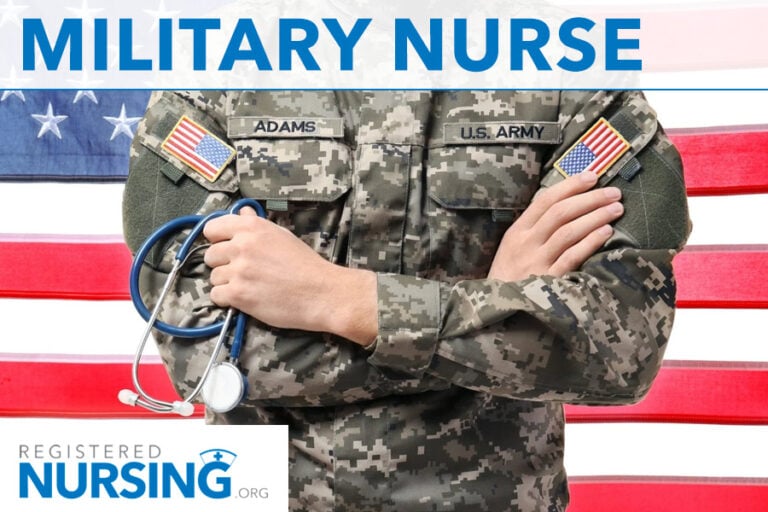Military/combat nurses are RNs who serve in a branch of the military and are specially trained to provide medical care to patients in military clinics or hospitals, or in makeshift medical facilities near combat zones. They may care for soldiers or other military personnel, veterans, or service members' families. Military/Combat nurses are required to make at least a three-year commitment to serve their country, but in return can receive benefits such as housing stipends, student loan repayment, and pensions.
What Is a Military/Combat Nurse?
Military/Combat nurses have licensed registered nurses who are contracted to provide medical care specifically to patients in military clinics and hospitals. Much like traditional registered nurses who treat civilians, military/combat nurses monitor wounds for infection, prepare patients for surgical procedures, and administer preoperative and postoperative care for those inside the military. Not only will military nurses have the chance to travel and see the world, but they also have access to excellent education and are compensated for time spent studying. They also enjoy excellent benefits, such as free healthcare. Additionally, the job responsibilities of military nurses include monitoring the pain and comfort levels of patients, assisting the disabled to care for themselves, and providing psychological and emotional support. During peacetime, military/combat/combat nurses will most often care for active-duty military personnel, military retirees, and their dependents. In some instances, they might even provide healthcare to civilian emergency patients. Conversely, during wartime, military nurses provide medical care in and around conflict zones and near battlefronts. A military/combat nursing career can be an immensely stressful, and often heartbreaking job. Furthermore, it can also be dangerous, since it isn't unusual for military/combat nurses to be deployed to foreign war zones along with active troops.
How to Become a Military Nurse
To become a military/combat nurse, you must first be a U.S. citizen. There are some personality traits that an individual should have if they're going to be competent military/combat nurses. Effective military/combat nurses should be in excellent physical shape and must be able to think clearly under stress so as to make life-saving decisions quickly. Additionally, military/combat nurses should have competent communication skills, be able to adapt to change quickly, and have high stamina and endurance. Military/combat nurses need to be able to work efficiently with little sleep.
What Are the Schooling Requirements for a Military Nurse?
The first step in becoming a military/combat nurse is obtaining your Bachelor’s of Science in Nursing, also known as a BSN degree. Typically, BSN degrees take around four years to complete. Although the military prefers its nurses to have BSN degrees, the Army Reserve accepts nurses with only Associate’s Degrees in Nursing or ADN degrees. However, these RNs are expected to have a BSN degree by the time they're ready for promotion as Captains. Once you have obtained your bachelor's degree in nursing, you are then permitted to sit for the state board examinations.
Once a civilian RN has undergone the primary educational processes involved in becoming a military/combat nurse, they will then also need to undergo officer training through whichever branch of the armed forces they wish to serve in. Officer training educates newly admitted RNs on leadership skills and military life. Additionally, during officer training, RNs are also required to show their proficiency in various physical fitness exercises. The timeline you will complete basic training will depend on which branch of the military you are enlisting in:
| Branch | Duration |
| Army | 10 Weeks |
| Navy | 8 Weeks |
| Air Force | 7.5 Weeks |
| Marine Corps | 13 Weeks |
| Coast Gaurd | 8 Weeks |
Are Any Certifications or Credentials Needed?
Before an individual becomes an official military/combat nurse, they must already have graduated from a nursing program approved by their state’s Board of Nursing and have taken and passed the National Council Licensure Exam (NCLEX-RN). Once you have passed your state board examination, you are eligible to obtain an RN licensure. After this, RNs can apply to a particular branch of the military, and if accepted, sign the necessary contracts and be sworn in.
Where Do Military Nurses Work?
Military/Combat nurses are required to make at least a three-year commitment to serve their country. Traditionally, military/combat nurses are stationed in a new region about every three years. There may be required travel just about anywhere abroad to help with emergency situations if they do happen to arise. Most nurses in the military are stationed at military/government facilities. Some, however, will serve in makeshift facilities as they near the front lines with combat units.
The most common places you will find military/combat nurses working are:
- Military Hospitals
- Military Clinics
- V.A. Hospitals/Clinics
- Pop-up/makeshift nursing facilities in and around combat zones
What Does a Military Nurse Do?
Being a military/combat nurse gives a person a unique chance to help others while serving their nation's people at the same time. However, it’s not a career path for everyone. Both psychological and physical demands, along with the extensive travel required, can make being a military nurse a challenging career. Nurses in the military often work in high-stress and fast-paced environments in situations that are physically dangerous and even life-threatening. Due to the kinds of working conditions, military nurses are often subjected to, they have the opportunity to develop top-notch nursing skills that may translate to further career advancement.
As a military/combat nurse, you’ll be able to specialize in psychiatry, pediatrics, and trauma. Some other specialties military/combat nurses work in are critical care, midwifery, emergency, and neonatal nursing.
What Are the Roles and Duties of Military Nurses?
The primary functions and obligations of active military/combat nurses are to:
- Treat wounded soldiers and other military personnel
- Treat service members’ families
- Set up military triage in war zones
- Treat patients worldwide
- Provide vaccinations to children in developing countries
- Assist in any humanitarian relief efforts the U.S. military might be engaged in
- Provide emergency care to victims affected by natural disasters
- Prescribe medication
- Work in pre-operative settings applying anesthesia
Military/Combat Nurse Salary & Employment
Military/combat nurses receive competitive wages and benefits, and most importantly, have the opportunity to build crucial skills and receive specialized training. The job outlook for military/combat nurses is particularly good. The grade or rank that military/combat nurses hold will determine the pay rate for which they are compensated. Many aren't aware of the fact that enlisted registered nurses in the military have opportunities to have their student loans repaid by government programs.
Over the next ten years, the military/combat nursing field is expected to grow seven percent—higher than average for job growth in other professions across the country. According to payscale.com and an estimate based upon a sample of 53 U.S. Army RN salaries, the average U.S. Army registered nurse earns $80,321, with a range of $61,500-$118,000 annually.
| Salary | |
| 25% Percentile | $61,500 |
| Average | $80,321 |
| 75th Percentile | $90,000 |
| 90th Percentile | $118,000 |
Other benefits that military nurses receive are housing stipends, low-cost or free health insurance, hazard pay when assigned to combat zones, and retirement plans. They receive 30 days of vacation per year, and they can retire after 20 years of service and receive a pension.
Helpful Organizations, Societies, and Agencies
- Army Nurses
- Navy Reserve Nurse
- Air Force Nursing
- Navy Nurse Corps
- U.S. Public Health Service Commissioned Corps
- Army Nurse Corps
- Amputee Coalition of America
- Army Nurse Corps Association (ANCA)
- US Army Medical Department Center and School (AMEDDC&S)
- Navy Nurse Corps Association (NNCA)










